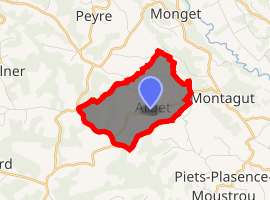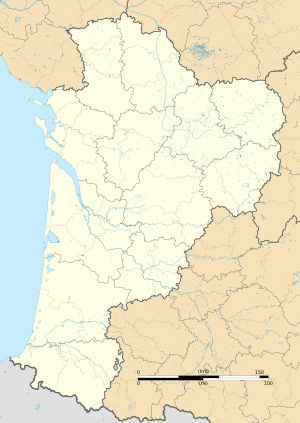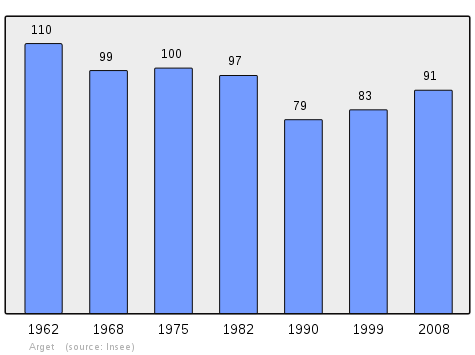Arget
Arget is a commune in the Pyrénées-Atlantiques department in the Nouvelle-Aquitaine region of south-western France.
Arget | |
|---|---|
An old farmhouse in Arget | |
Location of Arget 
| |
 Arget  Arget | |
| Coordinates: 43°32′38″N 0°31′38″W | |
| Country | France |
| Region | Nouvelle-Aquitaine |
| Department | Pyrénées-Atlantiques |
| Arrondissement | Pau |
| Canton | Artix et Pays de Soubestre |
| Intercommunality | Luys en Béarn |
| Government | |
| • Mayor (2014-2020) | Thierry Soustra |
| Area 1 | 4.00 km2 (1.54 sq mi) |
| Population (2017-01-01)[1] | 78 |
| • Density | 20/km2 (51/sq mi) |
| Time zone | UTC+01:00 (CET) |
| • Summer (DST) | UTC+02:00 (CEST) |
| INSEE/Postal code | 64044 /64410 |
| Elevation | 75–182 m (246–597 ft) (avg. 131 m or 430 ft) |
| 1 French Land Register data, which excludes lakes, ponds, glaciers > 1 km2 (0.386 sq mi or 247 acres) and river estuaries. | |
The inhabitants of the commune are known as Argétois or Argétoises.[2]
Geography
Arget is located some 18 km north-east of Orthez and 12 km south-east of Hagetmau on the border between Pyrénées-Atlantiques and Landes departments. It can be accessed by the D264 road from Montagut in the east passing through the commune and the village (of 2 buildings) and continuing south-west to Casteide-Candau. The commune has quite large areas of forest in the west but is mostly farmland.[3]
Several streams rise in the commune with the Hourquet forming the north-western border as it flows north-east to join the Ruisseau de la Rance at the northern tip of the commune. The Rance forms the north-eastern border as it flows north-west. The south-eastern border also consists of an unnamed stream which joins the Rance just outside the eastern tip of the commune.[3]
Places and hamlets[4]
Neighbouring communes and villages[3]
Toponymy
The commune name in béarnais is Arget.
Michel Grosclaude was unable to justify the local belief that the name means "sandy place" from arena (meaning "sand") with the collective suffix -etum (giving arenetum then arenet then areet then ariet), and could not conclude other than "of uncertain origin and meaning".[11]
The following table details the origins of the commune name and other names in the commune.
| Name | Spelling | Date | Source | Page | Origin | Description |
|---|---|---|---|---|---|---|
| Arget | Argiet | 1383 | Raymond | Luntz | Village | |
| Arzet | 1695 | Raymond | Order of Malta | |||
| Arget | 1750 | Cassini |
Sources:
- Raymond: Topographic Dictionary of the Department of Basses-Pyrenees, 1863, on the page numbers indicated in the table. (in French)[12]
- Grosclaude: Toponymic Dictionary of communes, Béarn, 2006 (in French)[11]
Origins:
History
Paul Raymond noted on page 10 of his 1863 dictionary that Arget depended on the Commandery of Malta of Caubin and Morlaàs and on the Barony of Moustrou, built in 1647, and was a vassal of the Viscounts of Béarn.[12]
Administration
List of Successive Mayors[15]
| From | To | Name | Party | Position |
|---|---|---|---|---|
| 1995 | 2001 | Chantal Gallenmuller | ||
| 2001 | 2020 | Thierry Soustra |
(Not all data is known)
Demography
In 2009 the commune had 93 inhabitants. The evolution of the number of inhabitants is known from the population censuses conducted in the commune since 1793. From the 21st century, a census of communes with fewer than 10,000 inhabitants is held every five years, unlike larger towns that have a sample survey every year.[Note 1]
| 1793 | 1800 | 1806 | 1821 | 1831 | 1836 | 1841 | 1846 | 1851 |
|---|---|---|---|---|---|---|---|---|
| 213 | 201 | 315 | 223 | 270 | 248 | 294 | 303 | 302 |
| 1856 | 1861 | 1866 | 1872 | 1876 | 1881 | 1886 | 1891 | 1896 |
|---|---|---|---|---|---|---|---|---|
| 282 | 227 | 206 | 190 | 195 | 200 | 205 | 193 | 172 |
| 1901 | 1906 | 1911 | 1921 | 1926 | 1931 | 1936 | 1946 | 1954 |
|---|---|---|---|---|---|---|---|---|
| 167 | 161 | 170 | 159 | 151 | 139 | 130 | 119 | 107 |
| 1962 | 1968 | 1975 | 1982 | 1990 | 1999 | 2006 | 2009 | - |
|---|---|---|---|---|---|---|---|---|
| 110 | 99 | 100 | 97 | 79 | 83 | 89 | 93 | - |

Culture and heritage
Civil heritage
Arget has many farms that are registered as historical monuments:
- A Farmhouse at Hourcq (1832)


- The Menusé farm at Pourtique (1897)

- The Lajournade farm at Pourtique (18th century)

- The Pemeste farm at Hourcq (1797)

- Houses and Farms

- A Farmhouse at Boué (1905)

- A Farmhouse at Hibet (1871)

- A Farmhouse at Carrèrot (1898)

- A Farmhouse at Touroun (18th century)

Religious heritage
The Parish Church of Notre Dame (12th century)![]()
Notable people linked to the commune
- Annie Beustes, born Annie Campagne, is a New Caledonian politician, born on 15 August 1945 in Arget.
See also
External links
- Arget on Lion1906
- Arget on Géoportail, National Geographic Institute (IGN) website (in French)
- Arget on the 1750 Cassini Map
Notes and references
Notes
- At the beginning of the 21st century, the methods of identification have been modified by Law No. 2002-276 of 27 February 2002 Archived 6 March 2016 at the Wayback Machine, the so-called "law of local democracy" and in particular Title V "census operations" allows, after a transitional period running from 2004 to 2008, the annual publication of the legal population of the different French administrative districts. For communes with a population greater than 10,000 inhabitants, a sample survey is conducted annually, the entire territory of these communes is taken into account at the end of the period of five years. The first "legal population" after 1999 under this new law came into force on 1 January 2009 and was based on the census of 2006.
References
- "Populations légales 2017". INSEE. Retrieved 6 January 2020.
- Inhabitants of Pyrénées-Atlantiques (in French)
- Google Maps
- Géoportail, IGN (in French)
- Ministry of Culture, Mérimée IA64000066 Farmhouse at Boué (in French)
- Ministry of Culture, Mérimée IA64000063 Farmhouse at Carrèrot (in French)
- Ministry of Culture, Mérimée IA64000064 Farmhouse at Hibet (in French)
- Ministry of Culture, Mérimée IA64000061 Farmhouse at Hourcq (in French)
- Ministry of Culture, Mérimée IA64000059 Menusé farm at Pourtique (in French)
- Ministry of Culture, Mérimée IA64000060 Farmhouse at Touroun (in French)
- Michel Grosclaude, Toponymic Dictionary of communes, Béarn, Edicions reclams & Édition Cairn - 2006, 416 pages, ISBN 2-35068-005-3 (in French)
- Topographic Dictionary of the Department of Basses-Pyrenees, Paul Raymond, Imprimerie nationale, 1863, Digitised from Lyon Public Library 15 June 2011 (in French)
- Contracts retained by Luntz, Notary of Béarn in the Departmental Archives of Pyrénées-Atlantiques (in French)
- Titles of the Order of Malta in the Departmental Archives of Haute-Garonne (in French)
- List of Mayors of France (in French)
- Ministry of Culture, Mérimée IA64000065 Lajournade farm at Pourtique (in French)
- Ministry of Culture, Mérimée IA64000062 Pemeste farm at Hourcq (in French)
- Ministry of Culture, Mérimée IA64000135 Houses and Farms (in French)
- Ministry of Culture, Mérimée IA64000001 Parish Church of Notre Dame (in French)
- Ministry of Culture, Palissy IM64002827 Furniture in the Church (in French)
- Ministry of Culture, Palissy IM64002780 Supplementary list of Furniture in the Church (in French)
- Ministry of Culture, Palissy IM64002651 Bronze Processional Cross (in French)
- Ministry of Culture, Palissy IM64002650 Wooden Processional Cross (in French)
| Wikimedia Commons has media related to Arget (Pyrénées-Atlantiques). |